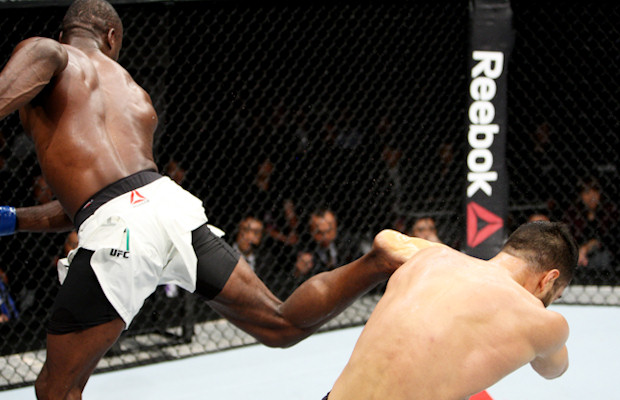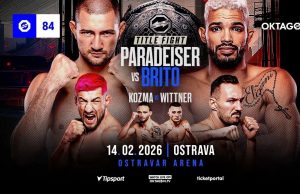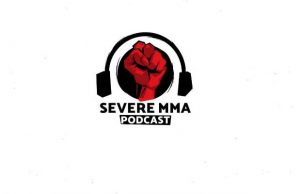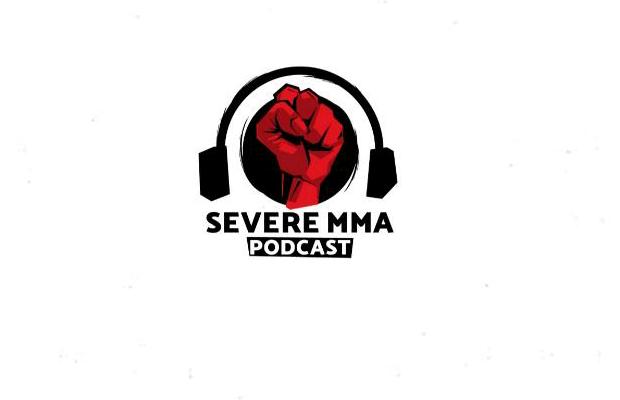
As a prizefighting sport, mixed martial arts is a venue ripe for the narrative of revenge. Whether it’s a favorite or a champion being usurped, or just another athlete trying to avenge a crippling loss, we’re constantly confronted with rematches, trilogies and stories about gaining dominance over a rival. Usually, though, revenge is not the primary motivaion in these cases. This is precisely what makes Saturday’s Uriah Hall-Gegard Mousasi clash such a treat.
Admittedly, this is not the main event a Belfast, Northern Ireland crowd wanted. While the previously slated Dong Hyun Kim-Gunnar Nelson might have mobilized the Northern Irish and Irish that have come to see Nelson as a pillar of its respective fighting communities, there was an obvious psychological and financial blow struck when Nelson pulled out due to injury and the Hall-Mousasi rematch was cobbled together to replace that fight. If there is a “proper” regional audience for a revenge bout between these two middleweights, Northern Ireland is certainly not it.
Alas, this is what any regional MMA fan should’ve come to expect when the Octagon rolls into town. Last time the UFC went to Dublin, the Joseph Duffy-Dustin Poirier bout fell apart at the last second, necessitating Louis Smolka and Paddy Holohan take main event duties. Suffice to say, these things happen. But on the grand scale of ad-libbed, last-second main events, quickly thrown together to “save” a smaller regional card, you could do an awful lot worse than Hall-Mousasi 2.
Here’s the deal. First, let there be no doubt that when it came to do 2015 year-end superlatives, only a crazy person would’ve dismissed Holly Holm’s dethroning of Ronda Rousey. Quite simply, Holm-Rousey is one of the most monumental, definitive moments in this sport’s history, a single swipe of Holm’s shin orienting us from one era to another. Given the nature of Rousey’s global celebrity, it may not be a stretch to say Holm-Rousey is the most watched fight ending in MMA history. It was a moment that defined 2015 and as such, it was Sherdog.com’s, and just about everyone else’s, “Upset of the Year.”
That said, not all upsets in MMA history are cut from the same cloth. I would argue that upsets at the elite level of MMA possess one of two qualities, if not both: one, they are a “sign of the times” for the sport and represent a historical moment, or two, they represent the triumph of a generally inferior fighter over a superior one, the classic “if they fought 100 times, X would win 99 times” scenario. As I said, there is no question that Holm-Rousey was a bellwether moment in MMA history, but what do we know about it as an “upset”? Even if she opened as a -1300 favorite on sportsbooks, what we know about Holm and Rousey now doesn’t make a hypothetical rematch a sure thing in any way. We still don’t know what we have with Holm, or how Rousey will respond when she attempts to recapture her UFC women’s bantamweight title from Amanda Nunes on Dec. 30. In its moment in Melbourne, Holm-Rousey was unthinkable, but as time goes on, it’s still unsettled how we will ultimately position that moment as an “all-time” upset.
The “greatest” of upsets are able to combine these two factors. This is why Georges St. Pierre-Matt Serra 1 stands the test of time as MMA’s greatest upset: not only do you have a fat lightweight fringe contender coming off of a reality show he arguably didn’t even win, Serra seemed stylistically made to order against GSP. It’s exactly the dynamic we saw in their rematch, when St. Pierre forced Serra to all fours and mercilessly kneed his ribcage in. Yet, at UFC 69, it just took Serra a few haymakers, heaven sent, to put down perhaps the best fighter in MMA history. It shocked everyone in the sport at the time and it still does today, because it’s abundantly clear that Serra’s surprise victory was not a function of him simply being discredited; he deserved to be counted out. We saw in a rematch exactly where both men stood and yet, somehow, that one night in Houston, Serra bombed all over GSP. It’s as dumbfounding today as it was then, because it was a “true” upset.
There are plenty of monumental, “Where were you when?” upheavals in this sport’s history, but as I said, most of them make sense with the benefit of hindsight. Sure, it was revolutionary in 1997 when Maurice Smith showed the world how to sprawl and brawl, stuffing Mark Coleman’s takedowns and chopping his legs out, but 20 years later, this seems like an understandable if not fully foregone conclusion. In 2001, it seemed unfathomable that Tra Telligman could piece Igor Vovchanchyn up the way he did, but looking back, it makes sense that an underrated boxer like Telligman could’ve used his size and craft over a bloated maker of hay like Vovchanchyn. These stand as historical “upsets” but they don’t shock us.
Meanwhile, “true” upsets, the upsets where we know how unlikely the original victor replicating their success would be, tend not to resound on this level. It might take Tito Ortiz 10,000 bouts until he ever beat, let alone finished, Ryan Bader ever again. Mackens Semerzier tapping out Waggney Fabiano? It’s just a factoid from the dustbin of history. Upsets like this, if there aren’t high stakes involved, tend not to stick out in the forefront of our minds.
It’s for these reasons that most celebrated rematches and rivalries don’t really have all the elements of “revenge” you would expect. At the very highest levels of MMA, sure, you have some legitimate personal beefs, like Jon Jones and Daniel Cormier or Dominick Cruz and Urijah Faber, but more often than not, rematches are about avenging losses in high stakes or championship situations, not “revenge” per se. You really think Chuck Liddell harbored ill will toward Randy Couture headed into their second fight? You really think deep in B.J. Penn’s soul, he hates Georges St. Pierre? These individuals become foils because their paths cross at the very apex of the sport.
And this is what makes Hall-Mousasi 2 a special rematch. There’s no real reason for this particular fight to take place at this particular moment, other than the UFC needed a main event and Gegard Mousasi found it especially important to exorcise the demons of what Hall did to him in Saitama, Japan in September of last year. If not for the cultural resonance of Holm-Rousey, it’s Hall’s video game combination handiwork against Mousasi that would’ve swept “Upset of the Year” honors.
Sure, there was no championship on the line, the stakes weren’t as high, but it was shocking in its moment and its shocking now. In a fight where every onlooker figured the dynamic Hall would need to literally land the best strike of his entire career to have a shot to beat Mousasi, he landed the two best strikes of his entire career — a spinning back kick to the head, followed by an incredible flying knee — and it still took a chaingun battery of punches to put Mousasi out of the fight. This is a fight where any sane judge would’ve given Mousasi a 10-8 in the first round for pulverizing Hall from mount. Somehow, Uriah Hall, a talented but mercurial enigma, put his finest skills on display against the best fighter and more notably, best defensive fighter, he’d ever faced and he won. For no reason other than finding this embarrassing and professionally limiting, Mousasi wanted a rematch. This is revenging, not avenging.
Despite the first fight’s outcome, Mousasi is as high as -550 on some sportsbooks as I write this; this harkens back to the “true upset” narrative, but more than that, their first fight does have historical resonance. The fact of the matter is that I’ve never seen a more spectacular offensive display used to upset a vastly superior technical, defensive fighter in MMA history, I don’t think. The jawdropping nature of it all also speaks to why Mousasi would want revenge and to try to erase the memories of the Hall knockout: it’s so damn memorable it’s held him back.
Sure, Mousasi has a recent loss to “Jacare” Ronaldo Souza in which he was dominated on the floor, but this is a middleweight division where Michael Bisping went from imminent retiree to UFC champion in the span of a week. Between politics and injuries, opportunities abound in a suddenly fruitful 185-pound weight class and over the last year, even with three dominant wins, Mousasi has been philosophically and conversationally disqualified from that discourse because he ended up on the wrong end of one of the craziest highlight reels we’ve ever seen. Most folks would handicap Mousasi as a favorite over Bisping if they fought tomorrow, a week from now, a month from now, but none of that seems to matter unless Mousasi is able to reconcile the Hall loss, simply because it was so unthinkable, so artistic, so stupendous.
Mousasi’s off-kilter demeanour may present as a lot of things, but malicious isn’t really one of them. I doubt he truly, deeply dislikes Uriah Hall in any personal fashion. Nonetheless, at 31 years old, Mousasi is in the prime of his career and amidst a weight class begging for contenders to step on up. It’s a world he wants to be a part of and should be a part of, save for when Uriah Hall turned into a Tekken character 14 months ago in Japan and loused everything up.
Mousasi is a professional; there’s no hate here. Still, unlike most notable MMA rematches, believe it’s about revenging and not just avenging. That’s worth savoring.













You must be logged in to post a comment Login